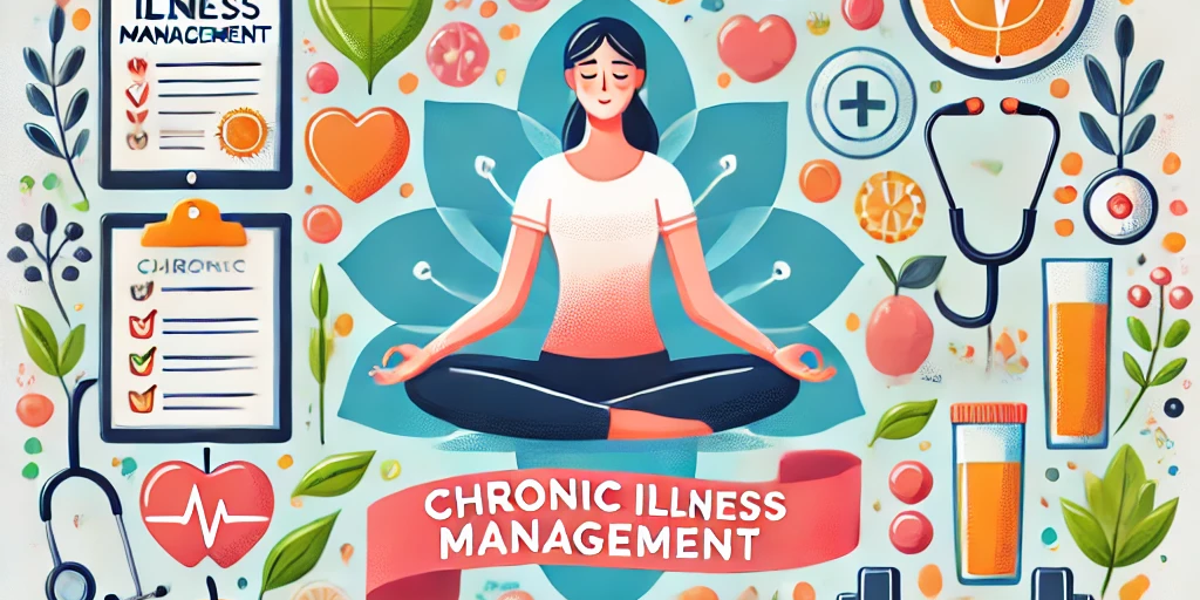Living with chronic illness will be difficult, requiring not solely medical treatment but conjointly a powerful personal commitment to take care of a top-quality life. From polygenic disorder and high blood pressure cardiovascular disease to asthma attack and inflammatory disease, the spectrum of chronic diseases affects millions globally. Understanding how to approach and manage these conditions will considerably improve physical and mental well-being.
This diary dives into the necessities of chronic illness management, giving insights into coping methods, building support systems, and adopting healthy mode habits. Whether or not you’re managing a condition yourself or supporting a love, the following pointers aim to guide you toward a lot of authorized and balanced approaches to health.
What is chronic illness Management?
Chronic illness refers to any health condition that persists for a year or a lot and needs current medical attention or limits daily activities. Managing such conditions involves a mix of medical aid, personal responsibility, and support from care professionals.
Critical parts of chronic illness management include:
Regular Medical Monitoring: Continuous pursuit of health metrics helps find early signs of complications.
Lifestyle Adjustments: Changes in diet, exercise, and daily habits will alleviate symptoms.
Emotional Resilience: Cultivating a positive mentality is vital for long-term well-being.
Effective management ensures that people maintain their independence, scale back the danger of severe complications, and revel in the next quality of life despite their conditions.
The Challenges of Chronic illness Management
Coping with chronic illness isn’t as regards addressing physical symptoms—it conjointly involves managing emotional, social, and monetary challenges. Some common obstacles include:
1. Adherence to Treatment Plans
Sticking to prescribed medications, therapies, or mode changes is essential; however, it is usually challenging. Factors like busy schedules, aspect effects, or a scarcity of motivation can cause non-compliance.
2. Emotional Stress and mental state
The constant pressure of managing a chronic condition may end up in anxiety, depression, or feelings of isolation. These emotional struggles will typically become as overwhelming because of the illness itself.
3. Monetary strain
Medical treatments, medications, and frequent doctor visits usually cause monetary burdens, particularly for those who do not have adequate sums.
Understanding these challenges is the commencement toward finding sensible solutions to manage them effectively.
Strategies for Effective Chronic illness Management
1. Build a cooperative care Team
Managing chronic illness isn’t a solo effort. A team of care professionals—including doctors, specialists, therapists, and dietitians—ensures comprehensive care. Regular check-ups, open communication, and asking the correct queries will assist you in staying on track.
2. Alter your Care setup
No two people have identical wants. Tailor your care plan to address your specific condition, preferences, and mode of operation. This personalization encourages adherence and improves outcomes.
3. Prioritise Healthy Habits
Balanced Nutrition: A nutrient-rich diet will scale back inflammation, stabilize energy levels, and support overall health.
Exercise: Regular physical activity helps maintain quality, boosts mental state, and prevents further complications.
Adequate Sleep: Restorative sleep promotes healing and supports immune operation.
The Role of Technology in Chronic illness Management
Technology has revolutionized care, making it easier than ever to manage chronic conditions.
Mobile Apps
Applications for medication reminders, fitness pursuit, and symptom work change daily routines.
Telehealth Services
Virtual consultations enable patients to access specialists from the comfort of their homes, eliminating travel-related stress.
Wearable Devices
Smartwatches and fitness trackers monitor very important signs like pulse, blood pressure, and aldohexose levels, providing timely information for better decision-making.
Integrating technology into your care setup will enhance each potency and effectiveness.
Mental and Emotional Well-Being
Chronicillness doesn’t simply affect the body; it also impacts the mind. Taking care of mental state is simply as very important as addressing physical symptoms.
1. Stress Management
Stress exacerbates several chronic conditions. Practices like heedfulness, yoga, and respiratory exercises can reduce stress and improve focus.
2. Medical care and guidance
Professional facilitation from therapists or support teams offers emotional relief, teaches coping methods, and builds resilience.
3. Building a Support Network
Connecting with others WHO perceive your journey creates a way of happiness and reduces feelings of isolation. Whether or not it’s a proper support cluster or shut down friends and family, social connections are a cornerstone of emotional health.
Empowering Caregivers and Families
Caregivers usually play an essential role in chronic illness management. Their support directly influences the individual’s overall health and emotions.
Providing Emotional Encouragement
Positive reinforcement and understanding will uplift people through tough times.
Assisting with sensible wants
From organizing medications to serving with appointments, caregivers will lighten the burden of daily tasks.
Educating Themselves
Caregivers ought to find out about theillness to produce abreast of practical help.
By fostering cooperation and mutual affection, families-associated caregivers produce an atmosphere of support and compassion.
Preventive Measures for Chronic illness
Prevention is usually the most effective management style. Proactive care reduces the severity of symptoms and prevents complications.
Early identification
Regular screenings and check-ups alter early detection, increasing the effectiveness of interventions.
Vaccinations and Preventive Care
Staying up-to-date with vaccinations protects against diseases that would exacerbate chronic conditions.
Lifestyle Modifications
Healthy decisions like quitting smoking, limiting alcohol consumption, and staying active considerably impact long-term health outcomes.
Community Support and Resources
Local resources will be priceless for those managing chronic diseases. From health workshops to community support teams, these programs provide sensible help and a sense of community.
Workshops and academic Seminars
Learning about the condition empowers people to take charge of their care.
Accessible care Services
Affordable and accessible care ensures a lot of folks will follow their treatment plans systematically.
Peer Support Networks
Sharing experiences and recommendations with others facing similar challenges fosters hope and friendship.
The Future of Chronicillness Management
Medical analysis and technology innovations still improve the outlook for people with chronic conditions. Advances in customized medication, genetic testing, and computer science promise more superficial and tailored treatments in the years ahead.
Moreover, a greater emphasis on holistic care—addressing each patient’s physical and emotional needs—ensures that future approaches will be more comprehensive and compassionate.
Conclusion
The journey of managing chronic illness might not be straightforward. However, it’s a path stuffed with growth, resilience, and discovery opportunities. By embracing effective methods, seeking support, and leveraging their resources, people will lead fulfilling lives while navigating their conditions.
Focusing on chronic illness management nowadays lays the inspiration for a healthier tomorrow. Whether or not through preventive care, technology, or emotional resilience, every discovery may be a step toward higher health and well-being. Together, we can remodel challenges into opportunities and pave the approach for many authorized approaches to chronic care.
Another Exciting Blogs: Child and Adolescent Health: Nurturing the Future Generations








Leave feedback about this